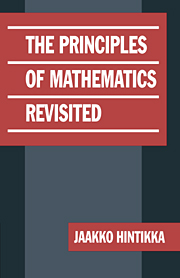Book contents
- Frontmatter
- Contents
- Introduction
- 1 The functions of logic and the problem of truth definition
- 2 The game of logic
- 3 Frege's fallacy foiled: Independence-friendly logic
- 4 The joys of independence: Some uses of IF logic
- 5 The complexities of completeness
- 6 Who's afraid of Alfred Tarski? Truth definitions for IF first-order languages
- 7 The liar belied: Negation in IF logic
- 8 Axiomatic set theory: Fraenkelstein's monster?
- 9 IF logic as a framework for mathematical theorizing
- 10 Constructivism reconstructed
- 11 The epistemology of mathematical objects
- Appendix (by Gabriel Sandu)
- References
- Index of names
- Index of subjects and titles
3 - Frege's fallacy foiled: Independence-friendly logic
Published online by Cambridge University Press: 15 December 2009
- Frontmatter
- Contents
- Introduction
- 1 The functions of logic and the problem of truth definition
- 2 The game of logic
- 3 Frege's fallacy foiled: Independence-friendly logic
- 4 The joys of independence: Some uses of IF logic
- 5 The complexities of completeness
- 6 Who's afraid of Alfred Tarski? Truth definitions for IF first-order languages
- 7 The liar belied: Negation in IF logic
- 8 Axiomatic set theory: Fraenkelstein's monster?
- 9 IF logic as a framework for mathematical theorizing
- 10 Constructivism reconstructed
- 11 The epistemology of mathematical objects
- Appendix (by Gabriel Sandu)
- References
- Index of names
- Index of subjects and titles
Summary
Several of the problems uncovered in the first two chapters above can be traced to a common source. This source is a somewhat surprising one. If there is an almost universally accepted dogma in contemporary logical theory and analytic philosophy, it is the status of the usual first-order logic as the unproblematic core area of logic. “If I don't understand it, I do not understand anything,” fellow philosopher once said to me in discussing first-order logic. And when on another occasion I expressed reservations concerning the claims of the received first-order logic to be the true Sprachlogik, the logic of our natural language, a well-known philosopher's response was: “Nothing is sacred in philosophy any longer.” He might have added, “Or in linguistics, either,” with a side glance at the role of the usual quantificational (first-order) notation as the preferred medium of representing logical form (LF) in Chomsky's linguistic theorizing.
Yet the received first-order logic, as formulated by the likes of Frege, Russell and Whitehead, or Hilbert and Ackermann, involves an important restrictive assumption which is largely unmotivated – or perhaps rather motivated by wrong reasons. This assumption is the hidden source of the problems registered above. For simplicity, I will refer to it as Frege's fallacy or mistake. Though I will not discuss the historical appropriateness or inappropriateness of that label here, it is of some interest to note that Peirce would have found it much easier to avoid this mistake – if he committed it in the first place.
Information
- Type
- Chapter
- Information
- The Principles of Mathematics Revisited , pp. 46 - 71Publisher: Cambridge University PressPrint publication year: 1996
